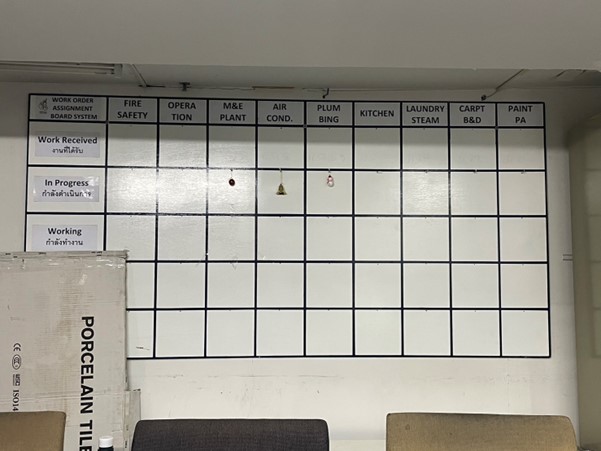The revolving door at the entrance of many hotel lobbies is an apt metaphor: Many such businesses are suffering from poor staff retention. Newly hired staff stay for short tenures – it is almost as though they enter one door and leave soon after the same way.
Inadequate retention is more than just a number’s game. Hotels invest a significant amount of resources in every new hire, including everything from recruiting to training. When the new employee quits, the business is not able to recoup this investment. The employee leaves the hotel before they are even financially and economically productive for the organization.
Staff attrition materially affects the business. Hotels lose money, and just as importantly, they lose manpower to fill in positions crucial to operations and guest services. While hotel leaders may sometimes think of attrition as an abstract problem, one beyond their control, they can directly improve retention by adopting better technology.
A task management system like Aiello’s TMS Pro can be particularly useful for improving retention.
Reduce burnout in overworked hotel employees
According to one study, 10 percent of HR leaders believe that employee burnout causes approximately half of all employee turnover every year. As leaders with a birds-eye-view of the workforce, they have deep insight on why employees are leaving. If they believe that exhaustion, stress, and other indicators of burnout are causing employees to quit, there is likely significant anecdotal evidence behind their assertion.
Fortunately, burnout is not an inevitability. This issue can be remedied with the use of a well-configured task management system. By centralizing tasks to a single platform, department leaders can ensure tasks are equitably distributed. Leaders can assign tasks to staff, and then monitor the status of each one to prevent instances where an employee might shirk responsibilities to reduce their workload.
In addition to insight into each task, hotel leaders are also afforded deep data analytics into the performance of their workforce. They can see who is completing the most tasks, how long they are taking to complete, and whether there are any anomalies in task completion.
The ability to identify issues at both the macro and micro level of task management will ensure that workload is evenly distributed. This level of fairness will dramatically reduce burnout, and in turn, any resulting turnover.
Transform bureaucratic culture into an innovative one
The legacy task management systems of most hotels are bureaucratic. Take the notepad system common at many hotel chains. An employee must jot down a task, such as a guest request, and then find the appropriate colleague to execute it, such as a member of the kitchen staff. That colleague then has to receive the note or copy it and do the same if the task has dependencies with other employees, and so on and so forth.

This kind of system also leads to attrition because it is understandably energy-draining and promotes a toxic culture. No one goes into the hospitality industry hoping to become a glorified note-taker. Thankfully, the implementation of a task management system will help to cut back this red tape.
Since tasks can be centrally assigned, employees no longer need to communicate tedious details about a request – everything is already detailed on the platform (they can even take photos to simplify communication even further!) Similarly, they no longer need to stop their work to give updates to a colleague or downstream or upstream colleagues – everyone can see what stage a task is in.
Employees, in short, can focus on what uplifts their morale rather than drains it: They can concentrate on doing their job to the best of their ability.
Adhere to the hotel’s core mission and vision
Although hotels may not be organizations dedicated to social good, they still nonetheless have a mission: To provide excellent accommodation and services to guests. Every worker in the hospitality industry, no matter what department they work in, wants to cater to the needs of their guests, be it through the cleanliness of the rooms and facilities, the flavor of the food, or the quality of the amenities.
Unfortunately, when hotel workers are more focused on redundant and unnecessary administrative work related to manual task management, they are pulled away from this core mission of serving guests. Study after study has shown that employees are more likely to resign when they become disconnected from the purpose of their work.
The best way to re-engage these employees is through a task management system like TMS Pro. When hotel leaders and employees more efficiently assign tasks, report on them, check their status, and communicate with others, they regain time that they can now provide back to guests.
Concierge staff can find opportunities to delight guests with upgrades and other extra bonuses. Staff at amenities, such as the spa or gym, can provide higher quality services to hotel patrons, who will enjoy the extra attention. Kitchen staff can place more attention on meal plating, so guests are visually tantalized when their food arrives.
These examples vary wildly, which should emphasize the key point: When task management is streamlined, hotel employees can find endless ways to better serve guests. Increasing guest interaction will reaffirm their purpose as hotel workers, provide them with fulfillment, and minimize the likelihood of their resigning.
Reducing attrition – for good
Most initiatives or programs to reduce attrition are a short-term, Band-Aid solution. For example, hotel leaders and their HR teams might offer one-time raises to high-performing employees, new perks like more free stays for their personal use, or programs that enhance recognition on a monthly or quarterly basis.
All these efforts will no doubt improve retention, but they will only result in a one-time bump. Once employees get accustomed to the new initiative, they will settle back into a baseline where the attrition risk is still high. The best way to combat attrition is through a foundation like an efficient task management system.
Such systems will help to minimize all the factors that contribute to attrition, such as employee burnout, bureaucratic workflows and culture, and disconnection from the core purpose of serving guests. These solutions reinvigorate employees, streamline processes, and give employees more time to focus on guests. With these changes, employees will not only stay with your hotel for longer tenures – but they will also be happy to do so, a feeling which will undoubtedly get passed onto your guests.


